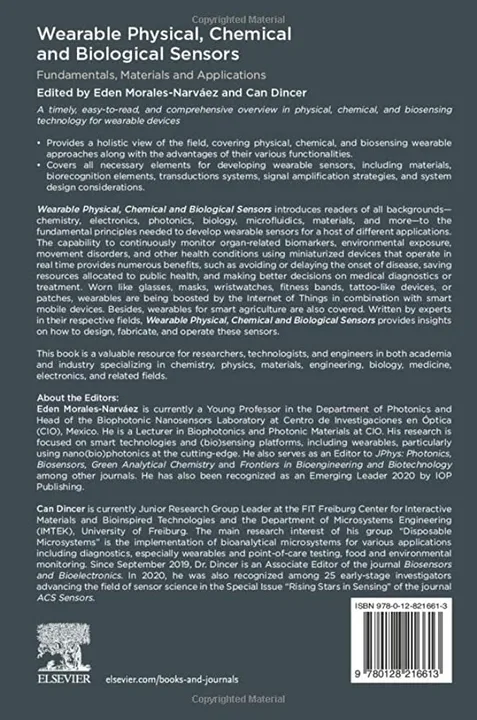What is a good book for reading biosensors?

Exploring the Benefits of Reading Books on Biosensors
Biosensors are a type of technology used to detect and measure biological or chemical reactions. Biosensors are used in a variety of applications, such as medical diagnostics, environmental monitoring, and food safety. Reading books on biosensors can help you gain a better understanding of the technology and its applications.
One of the main benefits of reading books on biosensors is that they provide an in-depth look into the technology. Reading books on biosensors can help you gain a better understanding of the science behind the technology and its various uses. Books on biosensors also provide detailed information on the types of biosensors available and how they work. This can be especially helpful if you are looking to purchase or use biosensors for a specific application.
Another benefit of reading books on biosensors is that they can provide insights into the latest developments in the technology. By reading books on biosensors, you can stay up to date on the latest advancements in the field and find out about new products and applications. This can help you make informed decisions about which biosensors to use for your specific applications.
Books on biosensors can also provide information on how to properly use and maintain the technology. Reading books on biosensors can help you learn about the proper installation, operation, and troubleshooting of the technology. This can help you ensure that your biosensors are working correctly and provide accurate readings.
Reading books on biosensors can also help you gain an understanding of the various regulations that are related to the technology. This can help you ensure that you are using the technology in accordance with applicable laws and regulations. This can help you avoid any legal issues or fines that may arise from improper use of the technology.
Overall, reading books on biosensors can provide a multitude of benefits. By reading books on biosensors, you can gain a better understanding of the science behind the technology and its various uses. You can also stay up to date on the latest developments in the field and learn how to properly use and maintain the technology. Finally, you can gain an understanding of the regulations associated with the technology. All of these benefits can be gained by reading books on biosensors.
Finding the Right Book to Learn About Biosensors
If you're looking to get a better understanding of biosensors, you'll want to find the right book that explains the concepts and applications in a straightforward and comprehensive way. This article will help you decide what book is best to start learning about biosensors.
Things to Consider When Choosing a Book
When you're searching for a book on biosensors, there are a few things to consider. First, consider the author. Look for an author who is an expert in the field and has experience in writing about biosensors. The author should have an impressive background in the field and a good reputation for producing quality material.
Second, look for a book that offers clear explanations and diagrams to help you understand the concepts. The book should be written in a way that is easy to understand and provides plenty of examples to help you visualize the concepts. It should also be up-to-date in its content and include the latest developments in biosensor technology.
Third, you'll want to ensure the book covers a wide range of topics related to biosensors. It should cover the basics of biosensor technology, such as the types of biosensors, their applications, and how they work. It should also discuss the potential applications of biosensors, such as medical diagnostics, environmental monitoring, and food safety.
Popular Books on Biosensors
One popular book on biosensors is "Biosensors: Fundamentals and Applications" by T. Pradeep. This book provides a comprehensive overview of the basics of biosensors, including the principles, types, and applications. It also includes plenty of diagrams and examples to help illustrate the concepts.
Another popular book is "Biosensors: Principles and Applications" by S. Dutta. This book provides an in-depth look at biosensors and their applications in medical diagnostics, environmental monitoring, food safety, and more. It also includes detailed diagrams and examples to help you understand the concepts.
Finally, the book "Handbook of Biosensors and Biodetection" by P.R. Bhargava is a great resource for those looking for an advanced understanding of biosensors. This book provides a comprehensive overview of the principles, types, and applications of biosensors, as well as detailed discussions on the current trends and future directions of the field.
A Comprehensive Guide to the Best Books on Biosensors
Biosensors are increasingly important in the medical and research world, as they can detect and measure biological compounds, and in turn, be used to diagnose and treat human diseases. If you want to learn more about biosensors, then a great way to do so is to read books on the topic. This comprehensive guide will provide you with an overview of the best books on biosensors.
1. “Biosensors: Principles and Applications” by Barbara R. Wroblewski
This book provides a comprehensive introduction to the principles and applications of biosensors. It begins by explaining the fundamentals of biosensors, including the principles of operation, types of biosensors, and the applications for which they are used. It then introduces readers to the various types of biosensors, such as optical, electrochemical, acoustic, and mass-sensitive biosensors. The book also covers the most recent advances in biosensor technology, including nanobiosensors, lab-on-a-chip technology, and wireless biosensors. Finally, it describes the different applications of biosensors, including medical diagnostics, environmental monitoring, and food safety.
2. “Biosensors: Fundamentals and Applications” by Srinivasan Damodaran
This book provides a comprehensive overview of the fundamentals and applications of biosensors. It begins by explaining the principles of biosensor operation and the various types of biosensors, such as optical, electrochemical, acoustic, and mass-sensitive biosensors. It then covers the most recent advances in biosensor technology, including nanobiosensors, lab-on-a-chip technology, and wireless biosensors. The book also describes the different applications of biosensors, including medical diagnostics, environmental monitoring, and food safety. Finally, it provides an overview of the future of biosensors and their potential impact on society.
3. “Introduction to Biosensors: From Electric Circuits to Immunosensors” by M.T. González-Cuevas
This book provides an introduction to the principles and applications of biosensors. It begins by explaining the fundamentals of biosensors, including the principles of operation, types of biosensors, and the applications for which they are used. It then introduces readers to the various types of biosensors, such as optical, electrochemical, acoustic, and mass-sensitive biosensors. The book also covers the most recent advances in biosensor technology, including nanobiosensors, lab-on-a-chip technology, and wireless biosensors. Finally, it describes the different applications of biosensors, including medical diagnostics, environmental monitoring, and food safety.
4. “Handbook of Biosensors and Biochips” by K.L. Mittal
This book provides a comprehensive overview of the principles and applications of biosensors and biochips. It begins by explaining the fundamentals of biosensors, including the principles of operation, types of biosensors, and the applications for which they are used. It then introduces readers to the various types of biosensors and biochips, including optical, electrochemical, acoustic, and mass-sensitive biosensors and biochips. The book also covers the most recent advances in biosensor and biochip technology, including nanobiosensors, lab-on-a-chip technology, and wireless biosensors. Finally, it describes the different applications of biosensors and biochips, including medical diagnostics, environmental monitoring, and food safety.
5. “Biosensors: Types, Technologies, and Applications” by J.M. Anderson
This book provides a comprehensive overview of the different types, technologies, and applications of biosensors. It begins by explaining the fundamentals of biosensors, including the principles of operation, types of biosensors, and the applications for which they are used. It then introduces readers to the various types of biosensors, such as optical, electrochemical, acoustic, and mass-sensitive biosensors. The book also covers the most recent advances in biosensor technology, including nanobiosensors, lab-on-a-chip technology, and wireless biosensors. Finally, it describes the different applications of biosensors, including medical diagnostics, environmental monitoring, and food safety.
Examining the Top Books on Biosensors for Beginners
Biosensors are quickly becoming an integral part of many industries. From medical diagnostics to environmental monitoring, biosensors are an invaluable tool for collecting data and making informed decisions. As the technology advances, more and more individuals are looking to get a basic understanding of how biosensors work and how they can be used. If you’re new to biosensors, the best way to get started is by reading a book that covers the basics.
The first book on the list is “The Biosensor Handbook” by Christopher C. Davis and John R. Schenck. This book is an ideal starting point for anyone who is just beginning to explore the potential of biosensors. It provides an introduction to the basics of biosensor technology, including types of biosensors, the principles of operation, and applications. The book also covers the most recent developments in the field, including new materials and methods for improving performance.
The second book on the list is “Biosensors for Beginners” by John R. Schenck and Christopher C. Davis. This book provides a basic understanding of the principles of biosensors and the design and operation of different types of biosensors. The book also includes a comprehensive overview of the applications of biosensors, including medical and environmental monitoring.
The third book on the list is “Biomedical Biosensors” by Daniel Davis and John R. Schenck. This book provides a comprehensive overview of the principles and applications of biomedical biosensors. It covers the fundamentals of biosensors and their use in medical diagnostics, environmental monitoring, and other applications. The book also provides a detailed look at the design and operation of different types of biosensors.
The fourth book on the list is “Intelligent Biosensors” by John R. Schenck and Christopher C. Davis. This book provides an in-depth look at the design, operation, and applications of intelligent biosensors. It includes a comprehensive overview of the principles of operation and the applications of these sensors in medical diagnostics, environmental monitoring, and other areas. The book also covers the latest developments in the field, including new materials and methods for improving performance.
The fifth book on the list is “Design and Development of Biosensors” by John R. Schenck and Christopher C. Davis. This book provides a comprehensive overview of the design and development of biosensors. It covers the fundamentals of biosensor technology and the design and operation of different types of biosensors. The book also provides a detailed look at the applications of biosensors, including medical and environmental monitoring.
These five books provide a comprehensive overview of the basics of biosensors and their applications. They provide an ideal starting point for anyone who is just beginning to explore the potential of biosensors. Whether you are a student, researcher, or practitioner, these five books will give you a solid foundation in the basics of biosensors and their applications.
